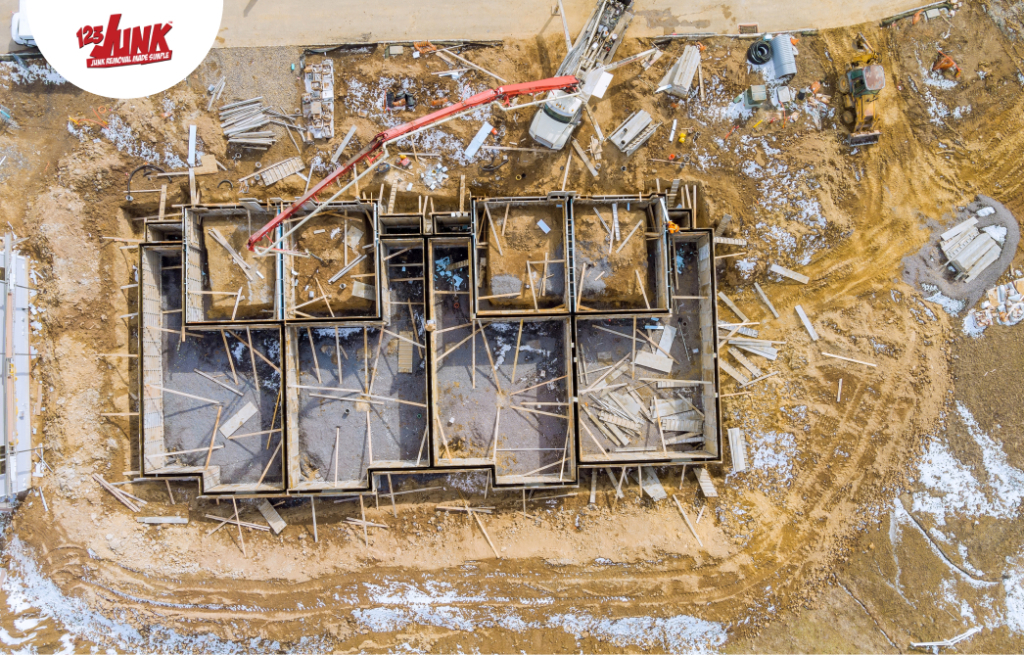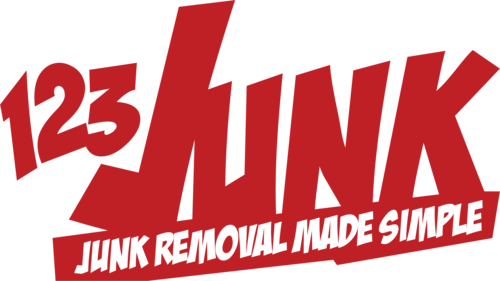Home renovations transform your living space but leave behind a considerable amount of construction debris that requires proper disposal. According to the EPA, the average renovation produces around 60 pounds of waste per square foot, making waste management an essential part of your project plan.
Understanding your disposal options and local requirements helps create an efficient, cost-effective cleanup process while maintaining environmental responsibility.

Types of Construction Debris
Wood materials encompass treated lumber requiring specialized disposal and untreated wood suitable for recycling into mulch or biomass fuel. Drywall and insulation must be contained properly to prevent the spread of particles and moisture damage.
Metals and electrical components hold significant recycling value. Copper wiring commands premium prices, while structural steel and aluminum from fixtures can be fully recycled when properly separated and prepared.
Concrete and masonry debris form the bulk of renovation waste by weight. These materials can be crushed for use as aggregate in new projects, while intact bricks and blocks often find new applications in other construction work.
Hazardous materials demand certified handling and disposal. Asbestos removal requires licensed professionals to follow strict safety protocols, while lead paint materials need EPA-compliant containment methods. These items must go to specialized disposal facilities.
Pre-Disposal Planning
Before beginning construction debris removal, proper planning helps prevent costly delays and safety hazards. Here’s what you need to consider:
- Map out waste categories and separate into wood, metal, concrete, and hazardous debris
- Measure renovation area in cubic yards (1-3 cubic yards per 100 sq ft) to determine container size
- Secure permits from the building department and review neighborhood collection restrictions
- Purchase required PPE: steel-toed boots, cut-resistant gloves, safety glasses, N95 masks
- Label waste zones clearly and establish sorting protocol for workers
- Scout ideal dumpster placement that allows truck access and protects property
- Research and schedule material-specific recycling pickups to reduce disposal costs
Disposal Methods
When it comes to removing construction debris from your renovation, several practical options can fit your needs and budget. Here’s a comprehensive look at each method:
Roll-Off Dumpster Rental
Think of a roll-off dumpster as your temporary on-site waste solution. These containers come in various sizes, typically from 10 to 40 cubic yards, with most home renovations needing a 20-yard container.
Rental periods usually span a week, though extensions are typical. You’ll need adequate space for placement, and most companies handle the delivery, permits, and pickup.
Consider weight limits and prohibited materials when choosing this option, as overages can increase costs.
Professional Junk Removal
For a hands-off approach, professional services like 123JUNK handle the entire process. Teams arrive ready to sort, load, and transport your construction debris, making this option ideal for busy homeowners or challenging removal situations.
While it may cost slightly more than self-service options, the convenience of having experienced crews manage the heavy lifting and proper disposal often justifies the investment.
Construction Debris Recycling Centers
Recycling centers offer an environmentally conscious disposal option, often at lower rates than landfills.
These facilities specialize in processing construction materials, from wood and metal to concrete and cardboard.
Many centers offer better rates for pre-sorted materials, and some even pay for valuable metals. They typically provide convenient drop-off hours and can handle large loads efficiently.
Local Landfill Options
Your local landfill typically offers the most economical disposal option, though it requires more effort on your part. Most charge by weight and maintain specific hours for construction debris.
While the fees are generally lower, remember to factor in transportation costs and time. Many facilities also offer reduced rates for sorted materials and maintain separate areas for recyclables.

Environmental Considerations
Modern renovation projects increasingly focus on sustainable disposal practices, not just out of environmental concern but also for cost savings.
Recyclable Materials Identification
Most construction debris has recycling potential.
Wood can be processed into mulch or biomass fuel, while metals hold significant scrap value. Clean concrete becomes aggregate for new projects, and untreated drywall often returns to manufacturers.
Even cardboard packaging and plastic wrapping from new materials can be recycled through standard programs.
Waste Reduction Techniques
Planning makes all the difference in minimizing waste. Accurate measurements help order the right amount of materials, while careful demolition preserves materials for reuse. Consider deconstruction instead of demolition when possible—removing materials intact often allows for donation or resale. Store new materials properly to prevent damage and waste.
Green Disposal Practices
Strategic sorting maximizes recycling potential and often reduces disposal costs. Many facilities offer better rates for pre-sorted materials. Consider donating usable items to local building material reuse centers. When selecting disposal services, look for companies that prioritize recycling and maintain relationships with material recovery facilities.
Environmental Regulations
Most jurisdictions now require construction waste management plans for renovations. These typically specify proper handling of hazardous materials, minimum recycling requirements, and documentation of disposal methods. Stay compliant by maintaining disposal records and obtaining necessary permits. Many areas also restrict certain materials from landfills, requiring specialized disposal methods.
Professional Services vs. DIY
Choosing between professional junk removal and handling debris yourself depends on several key factors. Here’s what to consider for your renovation project:
When to Hire Professionals
Professional services become essential when dealing with hazardous materials like asbestos or lead paint. They’re also worth considering for large-scale renovations, multi-story debris removal, or when time constraints are tight.
If your project requires special permits or involves complex sorting requirements, professionals can navigate these challenges efficiently.
Benefits of Professional Removal
Hiring experts means gaining access to proper equipment and experienced teams who understand disposal regulations. They handle all loading, transportation, and disposal logistics while guaranteeing proper material sorting and recycling. Professional junk removal is a less strenuous option—they create a stress-free process for you.
Professionals also carry appropriate insurance and understand local disposal requirements, reducing your liability and confirming compliance.
DIY Disposal Tips
If handling debris yourself, rent the right equipment, like wheelbarrows and heavy-duty tarps. Break down large items before moving them, and never overload containers or vehicles. Sort materials as you go rather than creating a mixed pile.
Always wear appropriate safety gear, including work gloves, sturdy boots, and eye protection. Consider recruiting help for heavy items to prevent injury.
From Debris to Done: Wrapping Up Your Renovation
Managing construction debris requires thoughtful planning and proper disposal methods to confirm project success. Implementing smart waste management practices protects both your property and the environment while potentially reducing overall costs.
The choice between professional services and DIY options ultimately depends on your project scope, but whichever path you choose, proper material sorting and recycling will make the process more efficient and environmentally responsible.

